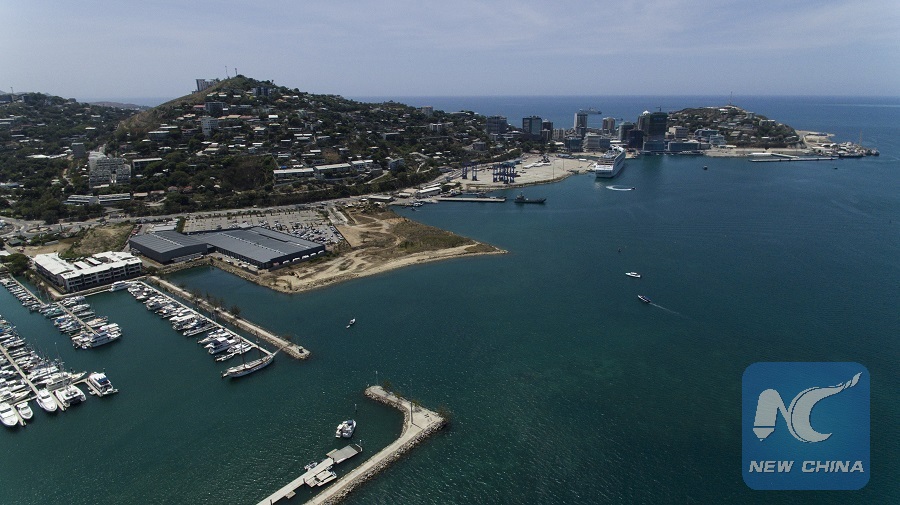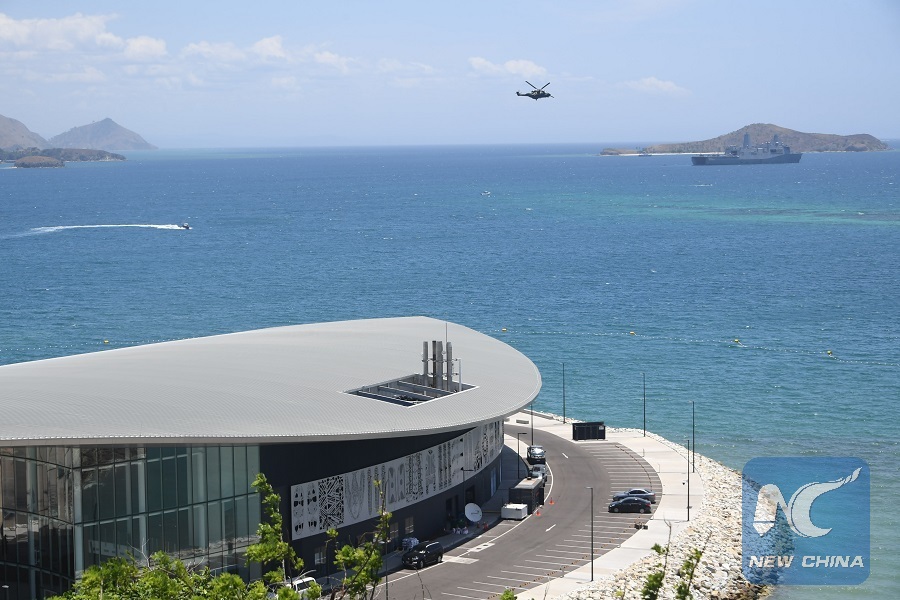
Photo taken on Nov. 10, 2018 shows the aerial view of Port Moresby, Papua New Guinea. (Xinhua/Bai Xuefei)
PORT MORESBY, Nov. 18 (Xinhua) -- The China-proposed Belt and Road Initiative is creating more and more cooperation opportunities between China and Pacific island countries, paving the way for their further integration into the global economy.
MORE COOPERATION
Papua New Guinea (PNG), the host of this year's Asia-Pacific Economic Cooperation (APEC) economic leaders' meeting, joined the Asian Infrastructure Investment Bank (AIIB) in May, and became the first Pacific island country to sign a memorandum of understanding with China on the Belt and Road cooperation in June.
PNG Prime Minister Peter O'Neill told Xinhua recently that "for international developing countries like PNG, this (the Belt and Road Initiative) is a great initiative because of the access to capital and infrastructure-building capacities that we are now developing together with China. It is able to open up markets and improve the standard of living for our people."
"The initiative is something that is good for PNG and good for the region and globally it will continue to promote trade and investment for all countries," he added.
Earlier this month, the tropical nation of Fiji also signed a memorandum of understanding with China on cooperation within the Belt and Road framework.
"Fiji highly appreciates and supports the BRI (Belt and Road Initiative), and will actively participate in the development of the initiative in a bid to further strengthen the bilateral cooperation between the two countries," Fiji's Permanent Secretary for the Office of the Prime Minister Yogesh Karan said.
As one of the first Pacific island countries to establish diplomatic relations with China, Samoa has also expressed interest in partnering China on sustainable development projects.
"The Belt and Road Initiative is opening a vast market and bringing lots of opportunities for the world, particular for the small countries like Samoa in the South Pacific region in this difficult time and challenges posed by climate change," Samoa's Prime Minister Tuilaepa Sailele Malielegaoi said in an interview with Xinhua earlier this year.
Proposed by China in 2013, the Belt and Road Initiative refers to the Silk Road Economic Belt and the 21st Century Maritime Silk Road, which aims to build a trade and infrastructure network connecting Asia with Europe and Africa.
David Morris, trade commissioner at Pacific Islands Trade and Invest, an agency under the Pacific Islands Forum Secretariat, said the initiative can help build the infrastructure and connectivity needed across the developing world and beyond, stressing that openness and cooperation are the only way to ensure inclusive and sustainable development.
LESS BARRIERS
Many Pacific island countries are in great demand for infrastructure, which is crucial for regional connectivity and interaction with the world. The need matches a key target of the Belt and Road Initiative: to boost connectivity.
Jerry Agus, chief executive officer of PNG Tourism Promotion Authority, said infrastructure is very important for Pacific island countries and "without infrastructure, you can not do anything. Our (geological) environment is very unforgiving. We need roads, airports, bridges."

A helicopter flies near the Leaders' Conference Centre in Port Moresby, Papua New Guinea, on Nov. 14, 2018. (Xinhua/Lui Siu Wai)
PNG has been undertaking infrastructure projects to meet the demand of its growing economy.
"In our province, we are building a university, expanding an airport, and planning to build a new port. Also we wanted to upgrade our hydro-power generation station, for the power generation capacity could not meet demand of the province," said Joseph Cajetan, acting administrator for the Southern Highlands Provincial Government in PNG.
"The BRI can really benefit PNG, especially with electric power supply, as PNG is developing fast and there is great demand for energy and we are running out of capacity," he said, adding that he is ready to sign more cooperation contracts with organizations or businessmen from China.
To gain access to finance being crucial for connectivity, many Pacific island countries have joined the AIIB amid efforts to boost infrastructure, trade and investment, including PNG, Fiji, Samoa, Tonga, the Cook Islands and Vanuatu, among others.
Recently, PNG has introduced its first sovereign bond and it was 600 percent over-subscribed. As a result, O'Neill said his country expected more cooperation with financial institutions in China within the Belt and Road framework.
EMERGING FIELDS
With expanding and deepening cooperations, the connotation of the Belt and Road Initiative has also been widening, involving the digital silk road and green silk road, creating more chances for China and the Pacific island countries to work together.
The overarching theme of this year's APEC economic leaders' meeting, "Harnessing Inclusive Opportunities, Embracing the Digital Future," indicates that cooperation between China and Pacific island countries will go beyond traditional sectors such as agriculture, fishery, infrastructure and natural resources into emerging sectors like the digital economy, according to Xu Xiujun, a researcher with the Institute of World Economy and Politics at the Chinese Academy of Social Sciences.
John Kongoi, managing director of a small to medium technology company in PNG, hoped PNG and China can cooperate more on digital infrastructure, saying it is "very expensive here" to go online and thus the cost is high for smaller enterprises to do business.
However, he was confident that his business will prosper if digital infrastructure is improved, because if more people have access to Internet, he will have more clients to buy services and equipment.
Meanwhile, climate change, one of the greatest challenges facing Pacific island countries, is a priority of their international cooperation.
"As the world's largest developing country, China has made remarkable progress in green technology and thus can provide support for the Pacific island nations to help them cope with climate change and build their green economy," Xu said.

